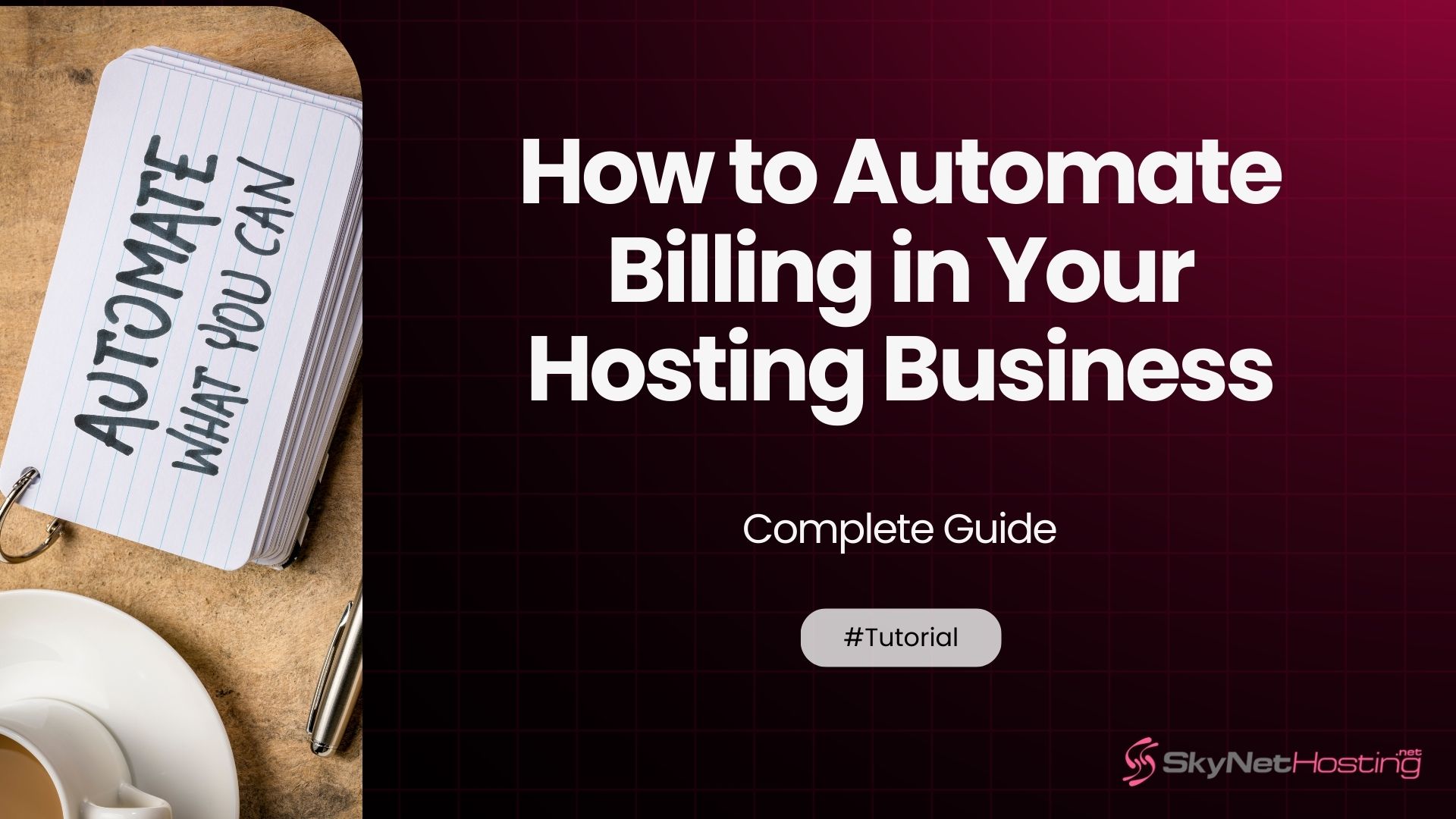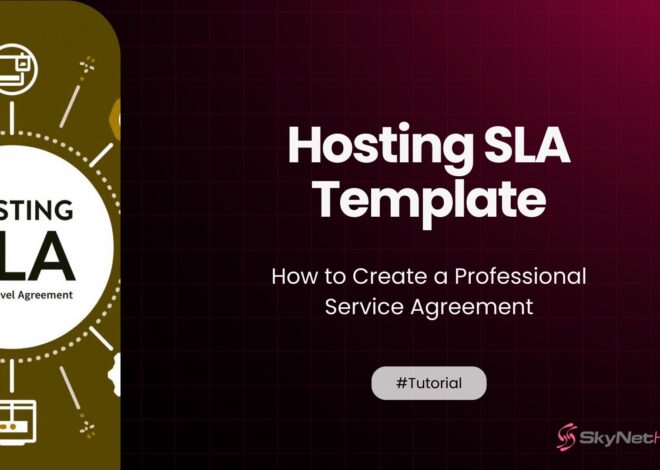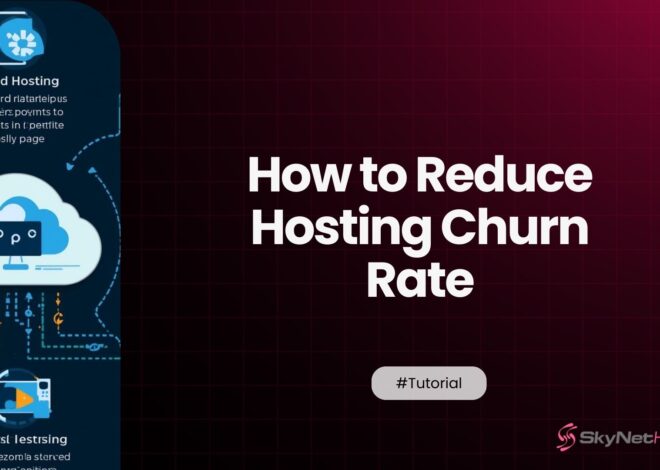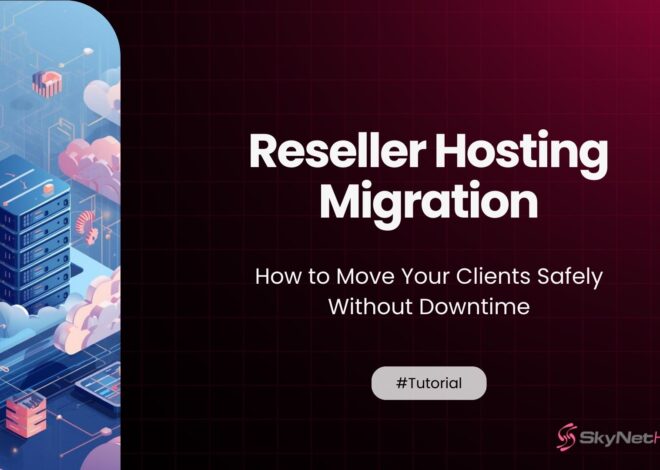
How to Automate Billing in Your Hosting Business
TL;DR
- Automating billing in hosting businesses eliminates manual invoicing, reduces errors, saves time, and improves customer experience with instant account activation and professional communication.
- WHMCS is the industry-standard billing automation tool for hosting, integrating with cPanel/WHM and domain registrars to streamline invoicing, provisioning, and support.
- Proper integration includes automatic account creation, resource allocation, domain registration, suspensions on non-payment, and termination workflows.
- Payment gateway integration (PayPal, Stripe, credit cards) with retry logic for failed payments and automated refunds helps maintain steady cash flow and customer satisfaction.
- Common automation mistakes include failing to test setups, poor customer communication, and inadequate payment security compliance (PCI-DSS).
- Scaling billing automation involves upselling add-ons, offering reseller packages with white-label billing, and expanding automation features as the hosting business grows.
Running a hosting business without automated billing is like trying to manage a restaurant without a cash register. You might survive, but you’ll drive yourself crazy in the process.
After spending over a decade in the hosting industry, I’ve seen countless business owners struggle with manual invoicing, missed payments, and the endless cycle of administrative tasks that eat up their time. The good news? Automating your hosting billing isn’t just possible, it’s essential for scaling your business.
This comprehensive guide will walk you through everything you need to know about automating billing in your hosting business. From choosing the right tools to setting up seamless workflows, you’ll learn practical strategies that actually work in the real world.
Whether you’re just starting out or looking to streamline your existing operations, you’ll discover actionable steps to transform your billing process from a time-consuming headache into a smooth, automated system that runs itself.
Why should you automate billing in your hosting business?
Let me be blunt: if you’re still manually creating invoices and chasing payments, you’re wasting valuable time that could be spent growing your business.
Reduce manual workload
Manual billing is a productivity killer. I’ve worked with hosting providers who spent 15-20 hours per week just managing invoices and payments. That’s half a full-time employee’s worth of work!
When you automate hosting invoices, you eliminate repetitive tasks like:
- Creating individual invoices each month
- Sending payment reminders
- Processing refunds
- Updating customer accounts after payments
Instead of spending your evenings wrestling with spreadsheets, you can focus on what really matters—acquiring new customers and improving your services.
Improve customer experience
Your customers want convenience. They don’t want to remember payment dates or wait for manual account activations.
Automated billing creates a seamless experience where:
- Accounts activate instantly after payment
- Customers receive clear, professional invoices
- Payment failures trigger automatic retry attempts
- Self-service portals let clients manage their own accounts
This level of professionalism builds trust and reduces support tickets. Happy customers are more likely to stick around and recommend your services.
Prevent missed payments
Manual processes lead to human errors. Forget to send an invoice? You’ve just delayed your cash flow by weeks.
Automated billing ensures every customer gets billed on time, every time. The system tracks renewal dates, sends reminders, and processes payments without your intervention. This consistent cash flow is crucial for business stability and growth.
What tools are available to automate hosting billing?
Choosing the right web hosting billing software is crucial. Let me break down your options based on real-world experience.
WHMCS (most popular choice)
WHMCS is the industry standard for good reason. It’s specifically designed for hosting businesses and includes everything you need:
- Complete billing automation
- cPanel/WHM integration
- Domain registrar connections
- Support ticket system
- Client portal
The learning curve can be steep, but once configured, WHMCS handles 90% of your billing tasks automatically. I’ve implemented WHMCS for dozens of hosting companies, and it consistently delivers results.
The standard license costs $15.95 monthly, but many hosting providers (like SkyNet Hosting) include it free with their reseller plans.
Blesta, ClientExec, and alternatives
Blesta offers a cleaner interface and better customization options than WHMCS. It’s particularly strong for businesses that need flexible billing cycles or complex pricing structures.
ClientExec provides solid automation features at a lower cost. It’s less feature-rich than WHMCS but perfectly adequate for smaller hosting operations.
Other options include:
- HostBill (comprehensive but expensive)
- WISECP (newer with modern interface)
- BoxBilling (open-source option)
Custom billing integrations
For larger operations, custom solutions might make sense. However, I rarely recommend this approach unless you have specific requirements that existing platforms can’t meet.
Building custom billing systems requires significant development resources and ongoing maintenance. Most hosting businesses are better served by established platforms.
How do you integrate automated billing with your hosting platform?
Integration is where the magic happens. Your billing system needs to communicate seamlessly with your hosting infrastructure.
WHM/cPanel integration
This is the backbone of hosting automation. When properly configured, your billing system can:
- Create cPanel accounts automatically after payment
- Set resource limits based on the purchased plan
- Suspend accounts for non-payment
- Terminate cancelled services
The key is using the correct API credentials and testing thoroughly before going live. I always recommend setting up a staging environment first.
WHMCS Integration
WHMCS is a powerful tool for streamlining your hosting business operations. With proper integration, WHMCS allows you to fully automate client management, billing, and support processes. Key features of WHMCS integration include:
- Automated invoicing and payment collection
- Domain registration and management syncing
- Client onboarding with welcome emails and setup instructions
- Integration with multiple payment gateways for flexibility
To ensure smooth operation, it’s essential to configure your WHMCS installation accurately.
For a step-by-step walkthrough on configuring WHMCS, refer to our WHMCS Full Setup Guide. This guide covers everything you need to know to get started, ensuring your system is set up correctly for optimal performance.
VPS and cloud server automation
For VPS providers, automation becomes more complex but equally important. Your billing system should integrate with your virtualization platform to:
- Deploy new VPS instances automatically
- Apply resource allocations correctly
- Handle upgrades and downgrades
- Manage IP address assignments
How do you set up automated invoices and payment gateways?
Getting your recurring billing hosting system right is critical for consistent cash flow.
Configuring recurring billing
Set up your billing cycles carefully:
- Monthly billing for most hosting services
- Annual billing with discounts to improve cash flow
- Quarterly options for business customers
- Custom billing cycles for enterprise clients
Always include grace periods. I recommend 5-7 days before suspending services. This prevents accidental suspensions due to temporary payment issues.
Integrating PayPal, Stripe, and credit cards
Payment gateway integration is crucial for automation. Your system should support:
- PayPal: Essential for many customers, especially internationally
- Stripe: Excellent for credit card processing with recurring payments
- Credit card processing: Direct merchant accounts for lower fees
- Bank transfers: Important for high-value services
Enable automatic retry logic for failed payments. Most payment failures are temporary (expired cards, insufficient funds), and retry attempts often succeed.
Handling refunds and chargebacks
Automate your refund process where possible:
- Set up automatic refund triggers for cancelled services within trial periods
- Create workflows for handling chargeback notifications
- Implement fraud detection to prevent problematic transactions
- Maintain detailed transaction logs for dispute resolution
How can you automate new account provisioning?
Fast provisioning sets you apart from competitors. Customers expect instant service delivery.
Auto-creating cPanel accounts after payment
Your automation workflow should:
- Verify payment completion
- Check for fraud indicators
- Create the cPanel account with correct resources
- Send welcome email with login details
- Activate any additional services
This entire process should complete within minutes of payment. Any delays frustrate customers and increase support requests.
Automated domain registration
Domain automation requires careful coordination:
- Check domain availability before processing payment
- Register domains immediately after successful payment
- Update DNS records automatically
- Send domain information to customers
- Handle registration failures gracefully
Setting resource limits
Automate resource allocation based on the purchased plan:
- Disk space and bandwidth limits
- Email account quotas
- Database limits
- Subdomain restrictions
- Add-on domain allowances
Use templates to ensure consistency across all accounts. This prevents overselling and maintains server performance.
How do you manage renewals and suspensions automatically?
Effective automation workflows prevent service interruptions while protecting your revenue.
Auto-renewal reminders
Set up a series of reminder emails:
- 30 days before expiration (first notice)
- 14 days before expiration (second notice)
- 7 days before expiration (urgent notice)
- 1 day before expiration (final notice)
Make these emails helpful, not pushy. Include payment links and account information to make renewal easy.
Grace period and overdue management
Implement a structured approach to overdue accounts:
- Day 1-5: Service continues with overdue notices
- Day 6-10: Suspend services but keep data
- Day 11-30: Final notices with termination warnings
- Day 30+: Terminate account and remove data
This progression gives customers multiple opportunities to pay while protecting your server resources.
Automatic suspension/reactivation
Your system should handle suspensions automatically:
- Suspend cPanel access and website functionality
- Continue email delivery (customers need to receive your notices)
- Maintain databases and files during grace period
- Reactivate immediately upon payment
- Send reactivation confirmation emails
What are the common mistakes to avoid when automating billing?
Learn from others’ mistakes to avoid costly problems.
Forgetting test runs before live setup
Never deploy automation directly to your live environment. I’ve seen businesses accidentally:
- Create hundreds of duplicate accounts
- Send payment reminders to already-paid customers
- Suspend active accounts due to configuration errors
- Process refunds incorrectly
Always test on a staging environment with sample data first.
Poor communication with customers
Automation doesn’t mean abandoning customer communication. Your automated emails should:
- Use clear, professional language
- Include all necessary account information
- Provide easy payment options
- Offer support contact information
Avoid overly technical language or confusing terminology.
Not securing payment data (PCI-DSS compliance)
Payment security isn’t optional. Ensure your billing system:
- Uses secure, encrypted connections
- Complies with PCI-DSS requirements
- Stores minimal payment information
- Implements proper access controls
- Maintains security patches and updates
A security breach can destroy your business reputation and result in significant legal liability.
How do you scale your hosting business with billing automation?
Once your basic automation is working, focus on growth opportunities.
Add-ons and upselling automation
Automate revenue growth through:
- Upgrade recommendations based on usage
- Automatic add-on suggestions during checkout
- Renewal upsells for additional services
- Cross-selling complementary products
Smart upselling can increase your average revenue per customer by 25-40%.
Expanding into reseller packages
Reseller hosting requires additional automation features:
- White-label billing solutions for resellers
- Automated reseller account creation
- Commission tracking and payments
- End-user support integration
This market segment often provides higher margins and more stable revenue.
White-label billing solutions
Allow resellers to brand your billing system as their own:
- Custom logos and color schemes
- Branded email templates
- Personalized domain names
- Custom payment pages
This professional appearance helps resellers build their own brands while using your infrastructure.
Where can you start with hosting automation today?
Ready to implement billing automation? Here’s your action plan.
Step-by-step checklist
- Choose your billing platform (WHMCS recommended for most businesses)
- Set up a staging environment for testing
- Configure basic billing cycles and payment gateways
- Test account provisioning with sample orders
- Set up email templates for automated communications
- Configure suspension and termination workflows
- Test thoroughly with various scenarios
- Train your team on the new system
- Go live gradually with existing customers
- Monitor and optimize based on results
Don’t try to implement everything at once. Start with basic automation and add features gradually.
Why Skynethosting.net provides ready WHMCS automation
If you’re looking for a shortcut to hosting business automation, consider providers that include WHMCS with their hosting automation tools.
SkyNetHosting includes a lifetime free WHMCS license (valued at $15.95/month) with all their reseller hosting plans. This means you can start your automated hosting business immediately without additional software costs.
Their reseller plans come pre-configured with:
- WHMCS billing automation already set up
- cPanel/WHM integration ready to use
- Payment gateway connections available
- Professional email templates included
- Free domain reseller account integration
This eliminates months of setup time and technical complexity. You can launch your fully automated hosting business in hours instead of weeks.
Transform your hosting business with smart automation
Billing automation isn’t just about saving time, it’s about creating a professional, scalable business that can grow without consuming your life.
The hosting industry rewards efficiency and reliability. Customers choose providers who deliver consistent service without delays or complications. Automated billing gives you that competitive edge.
If you’re ready to transform your hosting business with professional automation, consider starting with a provider like SkyNetHosting.Net that includes FREE WHMCS and automation tools from day one.
Your future self will thank you for making the investment in automation today. The hosting business is competitive, but automated systems give you the foundation to succeed and scale efficiently.
FAQs
Q1: Why is automating billing important for hosting businesses?
A1: Automation reduces manual workload, prevents missed payments, speeds up account provisioning, and improves customer experience with seamless invoicing and service activation.
Q2: What are the best tools for automating hosting billing?
A2: WHMCS is the most popular all-in-one platform, but alternatives like Blesta, ClientExec, HostBill, and open-source solutions exist depending on business needs.
Q3: How does WHMCS integrate with hosting platforms?
A3: WHMCS connects to cPanel/WHM to create, suspend, and terminate hosting accounts automatically, manages domain registrations, and integrates with payment gateways for billing.
Q4: What should I consider when setting up payment gateways?
A4: Support popular gateways like PayPal and Stripe, enable automatic retry for payment failures, offer multiple payment options, and ensure secure PCI-DSS compliant processing.
Q5: How to handle renewals and suspensions automatically?
A5: Set up timely renewal reminders, grace periods, service suspensions for unpaid invoices, and data retention policies with automatic reactivation on payment.
Q6: How can billing automation help scale my hosting business?
A6: Automation supports upselling, reseller billing with white-label branding, commission tracking, end-user support integration, and expands capacity without manual overhead.



